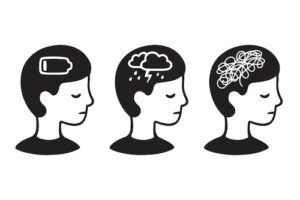If you have been struggling to figure out what is wrong with you, you may want to look into ARFID. ARFID, or Avoidant/Restrictive Food Intake Disorder, is a new food sensitivity that has been getting a lot of attention lately. This disorder is characterized by an extreme fear of eating certain foods and a limited diet as a result. If you think that you may have ARFID, it is important to get help from a doctor right away. In this blog post, we will discuss the symptoms of ARFID and other things about this newly discovered disorder.
Contents
What Is ARFID?
 ARFID refers to Avoidant/Restrictive Food Intake Disorder. It is a relatively new diagnosis, added to the Diagnostic and Statistical Manual of Mental Disorders (DSM-V) in 2013. ARFID is similar to anorexia in that both disorders involve avoidance of food and weight loss. However, unlike anorexia, ARFID is not motivated by a fear of weight gain or body image concerns.
ARFID refers to Avoidant/Restrictive Food Intake Disorder. It is a relatively new diagnosis, added to the Diagnostic and Statistical Manual of Mental Disorders (DSM-V) in 2013. ARFID is similar to anorexia in that both disorders involve avoidance of food and weight loss. However, unlike anorexia, ARFID is not motivated by a fear of weight gain or body image concerns.
There are two subtypes of ARFID: restrictive and binge/purge. People with the restrictive subtype avoid certain foods because they are afraid of the consequences, such as choking or vomiting. People with the binge/purge subtype eat large amounts of food and then purge, typically Avoidant/Restrictive Food Intake Disorderhrough vomiting or the use of laxatives.
ARFID can occur at any age, but it is most common in children and adolescents. It is estimated that 0.95% of adults have ARFID. The disorder is more common in females than males, and there is no racial or ethnic predisposition.
Moreover, this condition is not only about the physical response to food but it is also a mental health disorder. It is believed that ARFID is caused by a combination of biological, psychological, and social factors. So, this can be difficult to manage and overcome without help from a professional.
What Are The Symptoms Of ARFID?
The symptoms of ARFID can be physical, psychological, or both. Let’s take a look at each in more detail.
Physical symptoms of ARFID may include:
- Pain or discomfort when eating
- Nausea or vomiting
- Diarrhea
- Constipation
- Stomach bloating or cramps
- Weight loss or failure to gain weight (in children)
- Fatigue
Psychological symptoms of ARFID may include:
- Avoidance of foods due to a fear of choking or vomiting
- Fear of gaining weight
- Body dysmorphic disorder (BDD) – an intense preoccupation with a perceived flaw in appearance
- Obsessive-compulsive disorder (OCD) – obsessive thoughts and repetitive behaviors
- Anorexia nervosa – an eating disorder characterized by self-starvation and excessive weight loss
If you or a loved one are experiencing any of these symptoms, it’s important to see a doctor or mental health professional as soon as possible. ARFID is a serious condition that can have a major impact on quality of life. There are many resources available to support you on your journey to recovery.
Is ARFID A Mental Illness?
 ARFID (Avoidant/Restrictive Food Intake Disorder) is not currently classified as a mental illness until more research is done. However, it shares many characteristics with other disorders such as anorexia and bulimia. It is basically an eating disorder. However, given the fact that ARFID can be caused by or be comorbid with other mental illnesses, such as anxiety and OCD.
ARFID (Avoidant/Restrictive Food Intake Disorder) is not currently classified as a mental illness until more research is done. However, it shares many characteristics with other disorders such as anorexia and bulimia. It is basically an eating disorder. However, given the fact that ARFID can be caused by or be comorbid with other mental illnesses, such as anxiety and OCD.
ARFID is characterized by a fear of eating or drinking certain foods or beverages. This can be due to a variety of reasons, including the fear of choking, vomiting, or gaining weight. Also, there have been studies and still going on research that suggests a strong correlation between ARFID and certain mental illnesses.
For instance, some of the theories suggest that mental illness is usually the root cause of this eating disorder. When it comes to ARFID, much like anorexia and bulimia, the person suffering from this eating disorder is usually preoccupied with their weight and shape.
This is why people with ARFID are at a higher risk of developing an eating disorder later on in their lives. Or people with an eating disorder are more likely to develop ARFID.
There is no definitive answer to this question. However, given the fact that mental illness can be a cause or be comorbid with ARFID, it is safe to say that there is a strong correlation between the two. If you or someone you know is suffering from ARFID, please seek professional help.
What Triggers ARFID?
It is often difficult to identify the exact causes of ARFID as it can be triggered by a variety of factors. These include:
- Anxiety or fear around eating, which can be due to past trauma or negative experiences with food
- Certain medical conditions make it difficult to digest certain foods
- Sensory issues with certain textures, smells, or tastes of food
- Body dysmorphia or an intense fear of gaining weight
- Genetic factors may also play a role in the development of ARFID
- Choking or gagging on food
The causes of ARFID are actually a difficult thing to narrow down because they can be brought on by a multitude of different reasons. It could be due to psychological factors, physical difficulties, and sensory issues. So really, anything can trigger ARFID in someone who is predisposed to it.
More often, you should be on the lookout for behavioral changes in your eating habits. If you or someone you know begins to show signs of ARFID, it is important to seek professional help as soon as possible. Because this is a relatively new disorder, not a lot is known about it. However, doctors and mental health professionals are beginning to better understand how to treat ARFID. With the right help, you can begin to manage your symptoms and live a more normal life.
How Does It Impact Life?
 Disorders or conditions that make it difficult to consume or digest certain foods are not new. What is new, however, is the name given to one such disorder: Avoidant/Restrictive Food Intake Disorder, or ARFID. ARFID was only recently added to the Diagnostic and Statistical Manual of Mental Disorders (DSM-V) in 2013, and as a result, there is still much to learn about this disorder.
Disorders or conditions that make it difficult to consume or digest certain foods are not new. What is new, however, is the name given to one such disorder: Avoidant/Restrictive Food Intake Disorder, or ARFID. ARFID was only recently added to the Diagnostic and Statistical Manual of Mental Disorders (DSM-V) in 2013, and as a result, there is still much to learn about this disorder.
So, this condition can actually be difficult to live with, here are a few negative impacts of ARFID on life:
Social isolation and anxiety
As this avoidant/restrictive food intake disorder can make it difficult to eat with others, those suffering from ARFID may experience social isolation and anxiety. This is because mealtimes are often a time when friends and family come together, and someone with ARFID may feel left out or unable to participate. More often, it is believed that adults with ARFID tend to avoid social gatherings that involve food altogether.
Anxiety around food and mealtimes
Of course, not being able to eat certain foods can be anxiety-provoking in and of itself. But for someone with ARFID, this anxiety may extend to mealtimes themselves. This is because mealtimes can trigger anxiety and panic attacks. In fact, it is believed that anxiety is one of the most common symptoms of ARFID.
Weight loss or malnutrition
It seems obvious that if someone is not eating, they may lose weight or become malnourished. However, because ARFID can be difficult to diagnose, this weight loss or malnutrition may go unnoticed until it becomes severe. For example, someone with ARFID may appear to have an eating disorder such as anorexia nervosa when, in fact, they are suffering from ARFID.
Financial impacts
This might be one of the less obvious impacts of ARFID, but it can be significant nonetheless. If someone is not eating certain foods, they may need to buy special (and often more expensive) foods. In addition, if ARFID is severe, it may require treatment from a mental health professional, which can also be costly. For example, a person with this condition may need to see a therapist, dietitian, and/or psychiatrist.
So, these are some of the negative impacts of this condition that you should be aware of. If you or someone you know is suffering from ARFID, please reach out for help. There are many resources available to those affected by this condition.
There is no one-size-fits-all approach to treating ARFID, but there are a few general principles that can be helpful. First, it’s important to work with a team of professionals who understand the condition and can create a treatment plan that meets your specific needs. Second, treatment should focus on addressing the underlying causes of the disorder, whether they are physical, psychological, or both. And finally, treatment should aim to help you develop healthy eating habits and a positive relationship with food. So get help today!
How To Diagnose?
 An accurate diagnosis is a key to developing an effective treatment plan. There are diagnoses for this condition that basically include:
An accurate diagnosis is a key to developing an effective treatment plan. There are diagnoses for this condition that basically include:
- A comprehensive evaluation by a multidisciplinary team that may include a medical doctor, dietitian, and/or mental health professional
- A thorough history of the person’s symptoms, dietary habits, and any other relevant information
- Observation of the person’s eating behaviors
- Laboratory tests to rule out other conditions
These tests and evaluations are important in order to rule out other possible causes of the person’s symptoms and to develop an appropriate treatment plan. Moreover, you should keep in mind that ARFID is often comorbid with other conditions such as anxiety, depression, and obsessive-compulsive disorder (OCD).
So, this may be difficult to diagnose because it can masquerade as an eating disorder such as anorexia nervosa or avoidant/restrictive food intake disorder (ARFID). There is help available but at first, you should get an accurate diagnosis. After that, a comprehensive treatment plan can be developed to address the person’s specific needs.
What Are The Treatment Options For ARFID?
The treatment for this condition is similar to the treatment for other food sensitivities. However, some of the common treatment options include:
Cognitive-behavioral therapy
CBT is simply therapy that helps people change their thinking and behavior patterns. This can be helpful for people with ARFID because it can help them change the way they think about food and eating. The aim of CBT is to help people with ARFID develop a healthy relationship with food. This therapy is widely famous for treating different types of eating disorders. For example, it is one of the most common treatments for anorexia nervosa.
Exposure therapy
 This type of therapy is also known as systematic desensitization. The aim of this therapy is to help people with ARFID gradually become less afraid of the foods they are afraid of. This is done by slowly exposing them to the foods they are afraid of in a controlled and safe environment.
This type of therapy is also known as systematic desensitization. The aim of this therapy is to help people with ARFID gradually become less afraid of the foods they are afraid of. This is done by slowly exposing them to the foods they are afraid of in a controlled and safe environment.
The most important thing to remember is that you should always consult with a doctor or mental health professional before starting any type of treatment. They will be able to help you figure out which treatment option is best for you.
Nutritional counseling
Nutritional counseling is considered a key part of treatment for ARFID. A registered dietitian can help you develop a healthy relationship with food and eating. They can also help you create a meal plan that meets your nutritional needs. For example, if you are not getting enough vitamins and minerals from food, they may recommend supplements. So, nutritional counseling is actually one of the most important aspects of treatment for this condition.
Feeding therapy
This type of therapy is actually designed for infants and young children. However, it can also be helpful for people with ARFID. The aim of this therapy is to help people with ARFID learn how to eat normally. This is done by gradually introducing them to different foods in a safe and controlled environment. Studies have found that this type of therapy can be helpful for people with ARFID. Because it can help them develop a healthy relationship with food and eating.
Medication
There is no specific medication for ARFID. However, there are some medications that can be used to treat the symptoms of this condition. For example, if you have anxiety or depression, your doctor may prescribe medication to help with those symptoms. If you have trouble sleeping, your doctor may prescribe medication to help with that. So, there are some medications that can be used to treat the symptoms of ARFID. But, there is no specific medication for this condition.
However, some of the treatments for this condition are similar to the treatments for other food sensitivities. So, if you have food sensitivity, it is important to consult with a doctor or mental health professional to figure out which treatment option is best for you.
Support groups
People who have ARFID can also find support from groups of people who have similar conditions. This is actually a very important part of treatment for this condition. Because it can help you feel less alone and can give you a chance to share your experiences with other people. There are many different types of support groups for people with ARFID. You just have to find one that is right for you.
Self-care tips
 Self-care is something people avoid because it is hard. But, it is very important to take care of yourself if you have ARFID. Because this condition can be very overwhelming and can cause a lot of stress. So, it is important to find ways to relax and de-stress. Some self-care tips for people with ARFID include:
Self-care is something people avoid because it is hard. But, it is very important to take care of yourself if you have ARFID. Because this condition can be very overwhelming and can cause a lot of stress. So, it is important to find ways to relax and de-stress. Some self-care tips for people with ARFID include:
- Taking breaks throughout the day
- Eating healthy foods
- Getting enough sleep
- Practicing exercise
- Considering meditation and deep breathing
- Taking time for yourself every day
- Keeping a journal
These are just some of the self-care tips for people with ARFID. But, it is important to find what works for you. And, to make sure that you are taking care of yourself. Because if you don’t take care of yourself, it will be very difficult to manage this condition.
If you or someone you know has ARFID, there are many resources available to help. As this is a relatively new condition. So, there is still much to learn about it. However, there are some treatments that can be helpful for people with this condition. With these treatment options, you can choose what is best for you. And, you can develop a healthy relationship with food and eating.
Conclusion
Conclusively ARFID is defined as an eating disorder that is characterized by a fear of consuming certain foods due to the fear of choking, vomiting, or having an allergic reaction. While this may seem like a minor inconvenience to some, for those suffering from ARFID, the consequences can be much more severe.
You can contact Mantra care for the right kind of help. With the right treatment, you can start enjoying your meals again and living your life to the fullest. Mantra Care is a leading provider of mental health services around the globe. We offer a range of services including counseling, psychotherapy, and medication management. Our team of experienced professionals provides individualized care to each and every one of our clients. You can also book a therapy or download our free Android or iOS app.
Also, the team of certified nutritionists can help you develop a healthy weight loss program and consult with a registered dietitian or nutritionist through our online nutrition counseling program. So, you should not be afraid or ashamed to ask your doctor about ARFID, and if you think you might have it, there are treatment options available.


